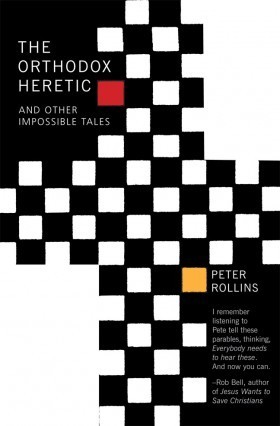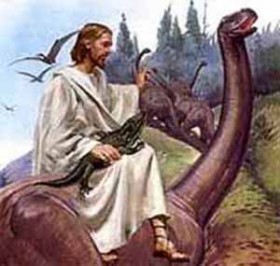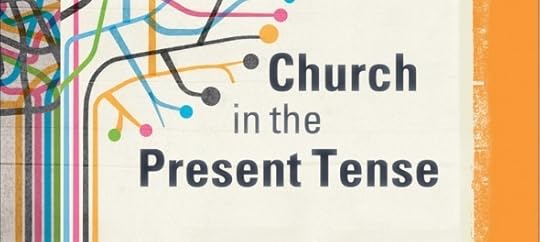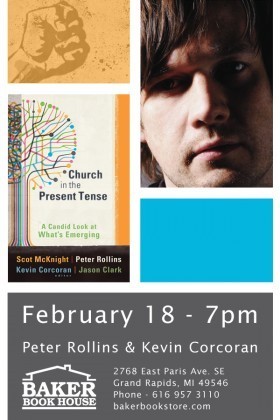Peter Rollins's Blog, page 61
March 4, 2011
The Orthodox Heretic
For so many the Christian faith is viewed as little more than a drug that enables the weak to escape reality. An opiate that helps its users to avoid facing the injustice of the world and making a stand against it. In short, the Christian faith is perceived to be a counter-revolutionary ideology that keeps people passive, infantile and ineffectual.
In contrast Rollins has created a series of parables that shatter this popular perception. Parables that demonstrate how radical faith has never been concerned with escaping the world we inhabit but rather with engaging in it more fully. That genuine Christian faith has never capitulated to injustice but rather fought against it at every turn.
February 23, 2011
Pyro-Theology at Mars Hill
February 22, 2011
God is The Littlest Hobo
When I was young I used to watch The Littlest Hobo. This was a fascinating show about a dog that would travel from place to place helping people in need before quietly leaving at the end. It might sound similar to Lassie, but there were several important differences. This dog had no owner, no name, preferred to be alone, and would always leave at the close of the episode. In addition to this we never knew where the dog had come from or where the dog was going to.
One of the interesting aspects of the show was the place that the dog occupied in the narrative structure. Usually the show would begin with a situation of human conflict and misery. At this point the mysterious dog would show up as a comforter. As the show progressed the dog would function as a means of bringing reconciliation and re-establishing harmony. Then, at the end, while everyone was celebrating the dog would quietly leave.
Lets concentrate on the last part for a moment. While the dog was a central part of the narrative for most of the show the last scenes rendered him utterly superfluous. In many of the episodes you could easily digitally remove the dog from the final scenes of human reconciliation and the structural integrity of the scene would remain utterly intact. The dog, who was so vital as the agent of change dissolves into the background completely and finally moves on.
Here we learn that the dog does not seek to be the object of love toward which the community focuses its attention, but rather seeks to establish love in the very midst of the community.
The structure is broadly this: Focus on human suffering, focus on dog as reconciler, focus on re-establishment of joy in the community. As soon as love is established the dog quietly disappears. In philosophical terms, the dog is a vanishing mediator opening up a transition between the two states.
This narrative structure can help shed light on the theological notion of the Christian dissolution of God: the world is a place of sin (death drive). God enters the world and provides the way to remove the sting of this sin (breaking law), then disappears, leaving the community of believers gathering to do the work of love. The journey is one in which our mode of understanding faith and transcendence undergoes a transformation. We begin by seeing God (directly) as an object that we love and end up encountering God (indirectly) through the act of love itself. God is the vanishing mediator who we remain faithful to when we gather together in love. Like the two disciples on the road to Emmaus, the moment we pull God back into sight God disappears.
Here we discover the divine movement as one that constantly drives toward a form of non-existence. God is like a host at a party who prepares the food, sets the mood and then quietly retires when the guests are all busy enjoying each others company. To grasp what this movement towards non-existence might look like it may be worth reading this earlier post entitled Love does not exist.
February 17, 2011
Who Do You Say That I Am? Should Christians be 'Non Self-Identifying'?
Interesting blog post from Kester Brewin which includes a brief reflection in the comments about the @realpeterollins phenomenon
February 16, 2011
Christianity and the Loss of Meaning
A quote from one of my chapters in the new book Church in the Present Tense:
"Christianity is not fundamentally hermeneutical but rather involves placing into question our various religious and political interpretations of reality. In other words, Christianity should not be approached as offering a thick interpretation of reality, an interpretation that would commit us to embracing a certain cosmology or anthropology. Rather, the fundamental Christian event involves exposing the contingency of all interpretations, opening up a desertlike space of negation where metanoia can take place (i.e. a substantive change in the individual rather than a mere quantitative improvement)"
You're the One
A little musical interlude for You…
… now back to work
February 14, 2011
Love does not exist – A valentines post
Love is so humble that it seems impossible to ever really catch anything but the briefest glimpse of her. She is like a tiny field mouse dwelling in the dark. Should we hear her scratching in the corner and shine a light she will, quick as a flash, scurry away so that we catch sight of only the tip of her tail. Indeed love is so bashful that we often forget about her entirely. For love, to change analogies, is like light. When we are sitting with friends we do not think about the light that surrounds us but only of the friends that the light enables us to see. Likewise love illuminates others and so our attention is focused on what she illuminates rather than with the illumination itself.
Love, in a very precise way, enables us to see. For in daily life we perceive others in much the same way as a cow gazes at cars. We walk past thousands of people without really seeing anyone. I was reminded of this recently when a friend of mine told me of something that happened when she took a train from Connecticut to New York. As the conductor, a large and imposing man, approached she realised that she had left her purse at the house. When he got to her seat and asked for her ticket she, with much embarrassment, explained the situation and braced herself for the worst. But the conductor just sat down in the seat opposite and said, "Don't worry about it". Then, for the remainder of the journey they talked. They shared photos of their family, they exchanged jokes and they spoke of the ones who meant most to them. When the conductor finally got up to continue his rounds my friend began to apologise again, but the conductor stopped her mid sentence and smiled, "please don't pay it any thought, you know its just really nice to be seen by someone."
This might initially seem like a strange thing to say as the conductor was being seen by thousands of people every day. But only in instrumental terms, only as the extension of a function he performed. In this brief conversation with my friend he felt that he had actually been seen as a unique individual and that was a gift to him.
This is what love does. It does not make itself visible but rather makes others visible to us. In a very precise sense then love does not exist but calls others into existence: for to exist means to stand forth from the background, to be brought into the foreground. Love does not stand forth but brings others forth. When we love our beloved is brought out of the vast, undulating sea of others. Just as the Torah speaks of God calling forth beings from the formless ferment of being so love calls our beloved from the endless ocean of undifferentiated objects.
In this way love is not proud and arrogant. It does not say, "I am sublime, I am beautiful, I am glorious". Love humbly points to another and whispers, "they are sublime, they are beautiful, they are glorious." It does not tell us that they are perfect despite their weakness and frailty, but that they are perfect in the very midst of their weakness and frailty.
Love does not want our hymns of praise or prayers of adoration. She does not want our sacrifices or seek our time. One cannot and should not even try to love love. For love always points away from herself. To honour love is to be in love, to swim in the world illuminated by her.
That which love illuminates means everything to us: a reality that can be exquisitely pleasurable or devastatingly painful. As such we will always experience the one we love as the most sublime existence in the universe. This experience however hides within itself a deep truth, a truth that we would do well to forget as soon as we learn of it (for it works best in darkness). Namely, that the most sublime presence in the universe is not our beloved but the love that exposes them as our beloved. The love that does not itself exist, but which raises our beloved to the level of existence.
February 13, 2011
On Love
Talk from Revolution on 13th February. To see the video that I show during the meeting click here
February 12, 2011
February 11, 2011
Creating Dis-courses
Peter Rollins's Blog
- Peter Rollins's profile
- 314 followers









